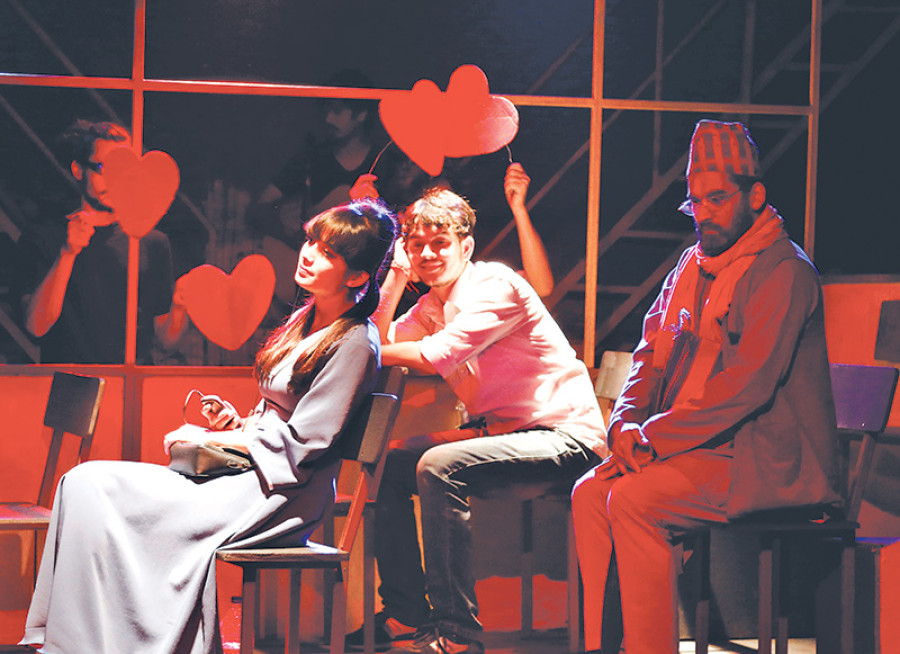Miscellaneous
All aboard
How do you go about striking a conversation with a total stranger without sounding like a creep? Imagine the stranger is elegant, composed and beautiful, one who immediately strikes your fancy and then captures the better part of your mind.
Timothy Aryal
How do you go about striking a conversation with a total stranger without sounding like a creep? Imagine the stranger is elegant, composed and beautiful, one who immediately strikes your fancy and then captures the better part of your mind. You are travelling on the same bus, albeit seated in different seats. Sounds familiar? You could say, “Hello! I was wondering if I have seen you somewhere before, have I? You went to this college, right?” or “Do you know Melina? … You just look like her, I was wondering if you were her sister or something.” The answer to both the questions would be a no, of course, but, if the stars are on your side, it might become a springboard for further conversations.
Watching the new play Ko Ek Chha Chha Ek Chha, you wish you could provide some tips to the play’s unnamed protagonist (played by Amrit Dhungana), who finds himself in a similar situation as mentioned above. He probably wouldn’t execute the tips well; he is completely frazzled from the time he first lays his eyes on the beautiful girl commuting on a night bus with him. A naïve boy of about twenty, who likes to imagine things rather than take the action, he is someone who would rather go home and pen a love letter in the quiet of the night. Our hero is travelling from Biratnagar to his stop Belbaari, on a night bus; bus number: Ko (shi) Ek Chha Chha Ek Chha. Alongside him is seated a beautiful lady (played by Nisha Karki), clad in a sky-blue dress. The two-seater is vacant to one side and our hero tries to grab a seat beside her but the khalaasi (played by Milan Karki) knows better. “Mahila Aarakshyan!” So begins the quandary of our forlorn hero.

The journey then takes a two-tier route. One is the real, in the bus itself; the other takes place in the mind of the protagonist. The ‘real’ journey features a driver (played by Anup Neupane), a loyal khalaasi, and two passengers. One is an elderly man (played by Aayan Khadka), who is a devout Hindu and keeps his eyes on an astrological patro, more often than not, throughout the whole journey. The elderly passenger is also greedy, as we discover when he snatches away a slice of cucumber from a local vendor (Rear Rai) at the Itahari bus stop. Perhaps to give the play an extra sense of realism, the director also introduces a brash passenger (played by Rohit Poudel), who embarks from a stop halfway and also tries to strike a conversation with our heroine.
This is a situation most travellers have faced, or seen, one time or another. Hence the premise of the play is instantly relatable. The characters are allocated with their individual quirks, easily stealing the audience’s empathy.
Ko Ek Chha Chha Ek Chha does evoke the absurdity of a night bus ride, making for an enjoyable watch for the first half, but then on, the ride feels redundant. You feel the dearth of dialogues; the pantomimes don’t quite cut it (the play is almost entirely silent, with the characters playing their roles as in silent films, the settings and the proceedings shown via placards).
A few more dialogue sequences could have done no harm. The play also features live music, which shines at moments, especially towards the end, but at times, feels as redundant as the plot itself. I would rather have the band play some Nepali folk rhythms than western-inspired tunes.
The play’s ‘real’ ride is punctuated by a journey that takes place inside the protagonist’s mind, which is more intriguing than the former, but it comes only now and then. In the psychological realm, our hero goes as far as, among other things, to imagine a wedding with the heroine, and it is presented quirkily, with the riders themselves taking part in the ritual (Neupane’s skills as a contortionist photographer is especially noteworthy).
Ko Ek Chha Chha Ek Chha doesn’t have a social case to make, as most of the plays of late. It seems it has three things in mind: entertainment, entertainment, entertainment. In achieving which, the play succeeds only to some measure. It brings together the latest crop of promising actors on stage, all shining in their roles, and that is perhaps its major achievement. If you are in the mood for some lighthearted comedy, go accompany them on the ride but don’t expect to take away anything from it.




 9.7°C Kathmandu
9.7°C Kathmandu










